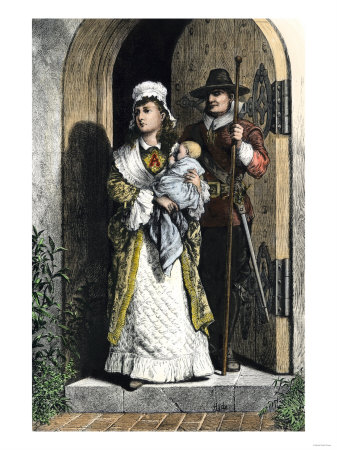Thursday, August 4: Femme Fatale
EASY READING
by Deborah Elliott-Upton
Easy reading is damn hard writing. ~Nathaniel Hawthorne
Nathaniel Hawthorne is best known to most high school students as the author of The Scarlet Letter—probably with a vision of Demi Moore (from the movie version) rather than the writer who created her character, the adulteress, Hester Prynne. That’s probably how it should be. The character should spring forth like a newborn baby into the reader’s mind. It should be an easy delivery with none of the author’s labor visible or even imagined.
Hawthorne’s close friend James Thomas Fields persuaded him to turnThe Scarlet Letter into a novel instead of a short story. I wonder if Fields wanted to know more about the characters and setting because Hawthorne had written the short story so easy for the reader to imagine that he must simply have more.
Easy reading is like listening to a song that touches your soul. The words don’t simply leave the memory and instead hang on like a lengthy monsoon season, impossible to ignore.
It seems to me that those songs that have been any good, I have nothing much to do with the writing of them. The words have just crawled down my sleeve and come out on the page. ~Joan Baez
And by the way, everything in life is writable about if you have the outgoing guts to do it, and the imagination to improvise. The worst enemy to creativity is self-doubt. ~Sylvia Plath
When a friend and I collaborated on a nonfiction project, others asked us why we thought we could when we’d been strictly fiction writers. Though we’d been working together quite well, doubt crept over us like an ugly pimple appearing on prom night. We shook it off, backed our ears and just wrote. The piece sold and became the first nonfiction either of us sold. A barrier was broken and it felt good. But, surprisingly not as good as when my fiction sells. Nonfiction is writing spelled-out, plain truth; fiction is where I can make up anything I want.
I would like to tell Sylvia Plath I did have the guts to write about crime, just not the will to do it in reality. I would like to tell Joan Baez I too, have had words crawl down my sleeve and end up on a page often to my amazement. I would like to thank Hawthorne for considering the short story as much a viable medium as the novel.





















I’m wit you. I’ve made the most money on non-fiction stuff but seeing something I created from nothing come alive in others eyes is worth so much more.
Very interesting array of writers you chose to relay your message…I liked!
I liked the base familiarity of the writers and their personal plights which made them noteworthy or more in their professional journeys.
I know I’m anal and read way more into things than I should, but what I am trying to say is, this article drew way more out of me than probably intended, but you did it anyway…intended or not.
That means you are gifted in your craft.
Now I am going to have to get my Baez music out and re-listen to her lyrics and Plath has always fascinated me and I’m still a little more than angry Demi Moore was chosen to screw up the role of Hester, so I won’t be torturing myself through that. I may, however, read the book again.
Thanks.
Debbie, this is a small masterpiece itself. Thanks for sharing.
Hawthorne’s Young Goodman Brown to my mind is his absolute masterpiece!
I don’t understand the rationale that fiction writers and worse– short story writers– lack the mental capacity to handle non-fiction.
Very strange. Made for a good article though.